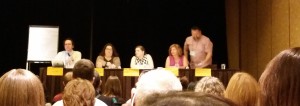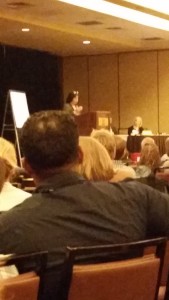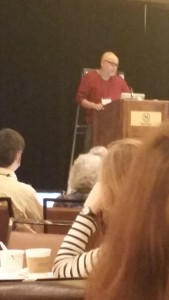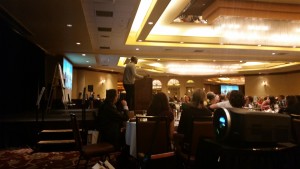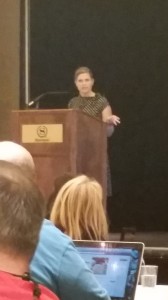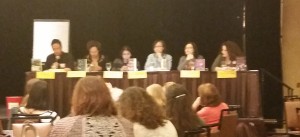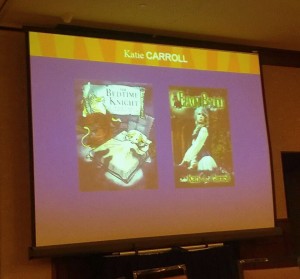Whenever I’m preparing to head off to a writing conference, I always find it fun and inspirational to look back on past conferences. I’m in kind of a discouraged state of mind about my writing. I’m waiting on one thing, I pulled another out of publication, and I have no major projects scheduled to be published right now. I’m trying not to focus on all the negatives in my writing career and instead plug away at my WIP, but I’ve got to admit I’ve been feeling a little low.
But I’m off to the 2016 New England SCBWI conference a week from Friday. I’m heading up early to get in some writing time before the conference starts that afternoon, and then I’ll be attending workshops, keynotes, and panels all weekend. And catching up with old writing buddies and hopefully meeting some new ones. Anyone else attending? Make sure to say “hi” if our paths cross. To keep us all inspired here are my conference gems from 2013 and 2015 NESCBWI conferences.
From 2013:
- We should meet the world with all our senses. ~Jeannine Atkins
- What’s outside in the setting can reflect what’s going on in the inside of a character, but it can also be in contrast to what’s being felt. ~Jeannine Atkins
- How do we access that which we are trying to recreate when we’re sitting at our desks or computers? Sometimes we need a sensory kick in the pants. ~Dawn Metcalf
- We work with art and it can evoke an objective response. ~Ruben Pfeffer
- It was as if someone else’s words had opened up a whole host of words in me. ~Sharon Creech
- As writers we want company; we need company. You come along too, please. ~Sharon Creech
- Revision is finding and strengthening the heart of a story, and revision is messier than people want it to be. ~Kate Messner
- Maybe I had to stop trying to prove to people I was good enough and just had to do the work I was passionate about. ~Grace Lin
- Every story has a message, whether or not the writer was aware of it or intended it. ~Chris Eboch
- I come to one little detail that sort of wakes up my mind and then start amassing details like constellations. ~Jeannine Atkins
- Writers are somewhat schizophrenic; we hear voices in our heads; we listen instead of conversing. ~Padma Venkatraman
- Go down the rabbit hole. ~Greg Fishbone
From 2015 (Wow! There are a lot here, but well worth the read.):
- If I like something, I will Internet stalk you. ~Carter Hasegawa
- Don’t be crazy on the interwebs. ~Jill Corcoran
- Things take a long time because they take a long time. ~Jennifer Laughran
- Often what I don’t think I’m looking for is what I fall in love with. ~Alison Weiss
- I was led to believe that social media was key to making you great. There are things that can work, but it has to be what works for you. ~Carter Hasegawa
- You are my tribe. ~Jane Yolen
- Books make the world a little smaller for people to reach out to each other. ~Jane Yolen
- Protect yourself so that there’s room to create. ~Carter Hasegawa
- Taking a chance, isn’t that what all of us do when we send out a manuscript? ~Stephen Mooser
- Taste–the one word to leave this conference with. ~Dan Santat
- “Nobody tells this to people who are beginners, I wish someone told me. All of us who do creative work, we get into it because we have good taste. But there is this gap. For the first couple years you make stuff, it’s just not that good. It’s trying to be good, it has potential, but it’s not. But your taste, the thing that got you into the game, is still killer. And your taste is why your work disappoints you. A lot of people never get past this phase, they quit…” Ira Glass quote referenced by Dan Santat (See the full quote on Goodreads.)
- Don’t be biased or censor yourself in what you like and read and how you form your taste. ~Dan Santat
- Be aware of your tastes and interests. This is your voice. Your voice is you writing on a piece of paper uncensored. ~Dan Santat
- Trust yourself; know that you have something inside of you. Trust that what you have to say has value. ~Dan Santat
- The hardest part of finding your style is trusting your own instincts. ~Dan Santat
- My skin needs to be thin because I don’t want to protect myself from feeling things. ~Deborah Freedman
- I’m just a guy who writes poetry. I’m just a dude. This is not happening (on winning the Newbery). ~Kwame Alexander
- You never expect to win, but somewhere in the deep crevices of your mind, you’re always hopeful. ~Kwame Alexander
- The answer is always yes! If I say yes and walk through the door, I will figure it out. ~Kwame Alexander
- I believe we have to get the nos out of the way to get our yes. ~Kwame Alexander
- Everyone has a story. It’s the reason why everyone acts the way they do. I saw my world differently and I was different (after reading THE CHOCOLATE WAR by Robert Cormier). ~Jo Knowles
- The more I read, the bigger my world became. ~Jo Knowles
- Even if I was afraid to use my voice out loud that didn’t mean I didn’t have one. ~Jo Knowles
- Kids understand love…hate and discrimination are what they learn from adults. ~Jo Knowles
- The moment we open a book and start reading, we change. ~Jo Knowles
- Your book does not belong in a box. Allow yourselves to find the truth and tell it. Open the box and tear down the sides. ~Jo Knowles
- People think diversity is a fad and that’s really offensive. I’ll still be brown tomorrow. ~Justina Ireland
- Authenticity is hard. Once a book is with a reader, it may not feel authentic to them. Make something that is authentic to you and make it universal. Make things that feel real. ~Grace Lin
- Build from an emotional core and that is what is authentic. ~Dhonielle Clayton
- Even in a family that is entirely Hispanic, each one of them is different. You still have a lot of work to do to make it real, even if you have a diverse background. ~Cindy L. Rodriguez
- Every kid wants to be the hero. ~Sona Charaipotra
- Be brutal with your work, but kind to yourself. ~Katie L. Carroll
- Write with your heart and soul, but revise with your head. ~Katie L. Carroll
- There’s no silver bullet to making your manuscript better. You have to put in the hard work. ~Katie L. Carroll
- Go beyond the Cinderella story when searching for inspiration. Think and read outside your comfort zone, and find what resonates with you by mining your own mind and heart. ~Katie L. Carroll
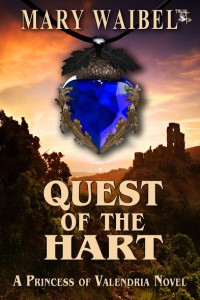
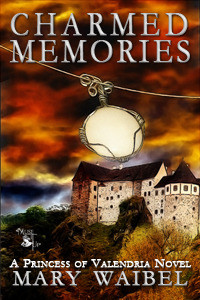 The second book in the Princess of Valendria series,
The second book in the Princess of Valendria series, 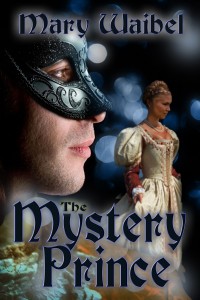
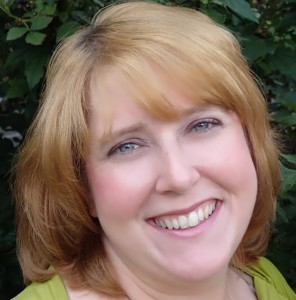
 As promised, I have the New England SCBWI 2015 Conference gems of wisdom and terrible pictures (seriously, I think the only decent picture I took all weekend is this one with the view from my hotel room). First, though, a reminder that the handout for my “Something Borrowed, Something New: Mining Myths, Legends, and Fairy Tales to Write Fantasy” workshop is available for download as a PDF here:
As promised, I have the New England SCBWI 2015 Conference gems of wisdom and terrible pictures (seriously, I think the only decent picture I took all weekend is this one with the view from my hotel room). First, though, a reminder that the handout for my “Something Borrowed, Something New: Mining Myths, Legends, and Fairy Tales to Write Fantasy” workshop is available for download as a PDF here: 